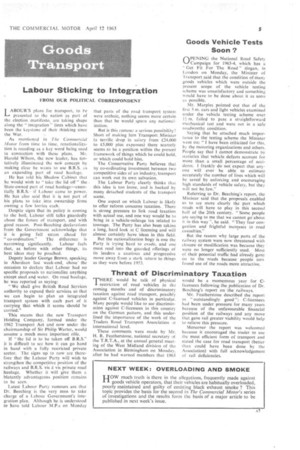Labour Sticking to Integration
Page 7

If you've noticed an error in this article please click here to report it so we can fix it.
FROM OUR POLITICAL CORRESPONDENT
LABOUR'S plans for transport, to bc presented to the nation as part of the election manifesto, are taking shape along the " integration " lines which have been the keystone of their thinking since the War.
As mentioned in The Commercial Motor from time to time, renationalization is receding as a key word being used
in connection with these plans. Mr. Harold Wilson, the new leader, has tentatively illuminated the neW concept by making clear he wants to use B.R.S.
an expanding part of road haulage.
He has told his Shadow Cabinet that lie, would wish to take the lid off" the State-owned part of road haulage-'—essen
tially. Labour came to power. He has also said that it is not part of his plans to take into ownership firms owning a few lorries each.
Despite signs that its policy is coming to the boil, Labour still talks guardedly about the future of transport, and with good reason. Post-Beeching declarations from the Government acknowledge that it is going full steam ahead for "co-ordination." The difference is narrowing significantly. Labour feels that, as before with other things; its best ideas may be poached. Deputy leader George Brown, speaking in Aberdeen last week-end, chose the occasion to declare that Labour had no specific proposals to nationalize anything except steel and water. On road haulage, he was reported as saying: "We shall give British Road Services authority to expand their services so that we can begin to plan an integrated transport system with each part of it carrying that which it seems should be carried."
, This means that the new Transport Holding Company, formed under the 1962 Transport Act and now under the chairmanship of Sir Philip Wailer, would assume a much more important role.
If the lid is to be taken off B.R.S." it is difficult to see how it can go hand in hand with a fully restricted private sector. The signs up to now are therefore that the Labour Party will wish to strengthen the competitive position of the railways and B.R.S. vis a vis private road haulage. Whether it will give them a blatantly advantageous position remains to be seen.
Latest Labour Party rumours are that Dr. Beeching is the very man to take -charge of a I.ahour Government's integration plan. Although he is understood to have told Labour M.P.s on Monday
that parts of the road transport system were archaic, nothing seems more certain than that he would spurn any nationalization.
But is this rumour a serious possibility? Short of making him Transport Minister (a terrific drop in salary from £24,000 to £5,000 plus expenses) there scarcely seems to be a position within the present framework of things which he could hold, or which could hold him.
The Conservative Party believes that by co-ordinating investment between two competitive sides of an industry, transport can work out its own salvation.
The Labour Party clearly thinks that this idea is too loose, and is backed by many detached students of the transport scene.
One aspect on which Labour is likely to offer reform concerns taxation.. There is strong pressure to link road taxation with actual use, and one way would be to bring in a vehicle-mileage tax related to tonnage. The Party has also been takinc a long, hard look at C licensing and will almost certainly have ideas in this field.
But the nationalization bogy is one the Party is trying hard to evade, and one must read into the guarded offerings of its leaders a cautious and progressive move away from a stark return to things as they were before 1953. •








































































































